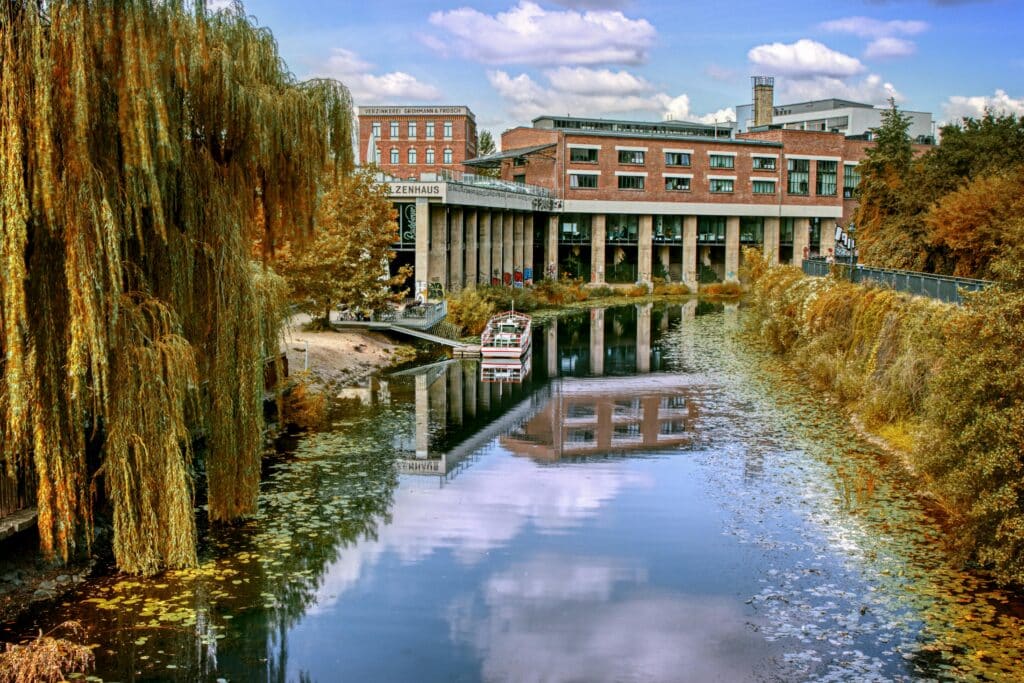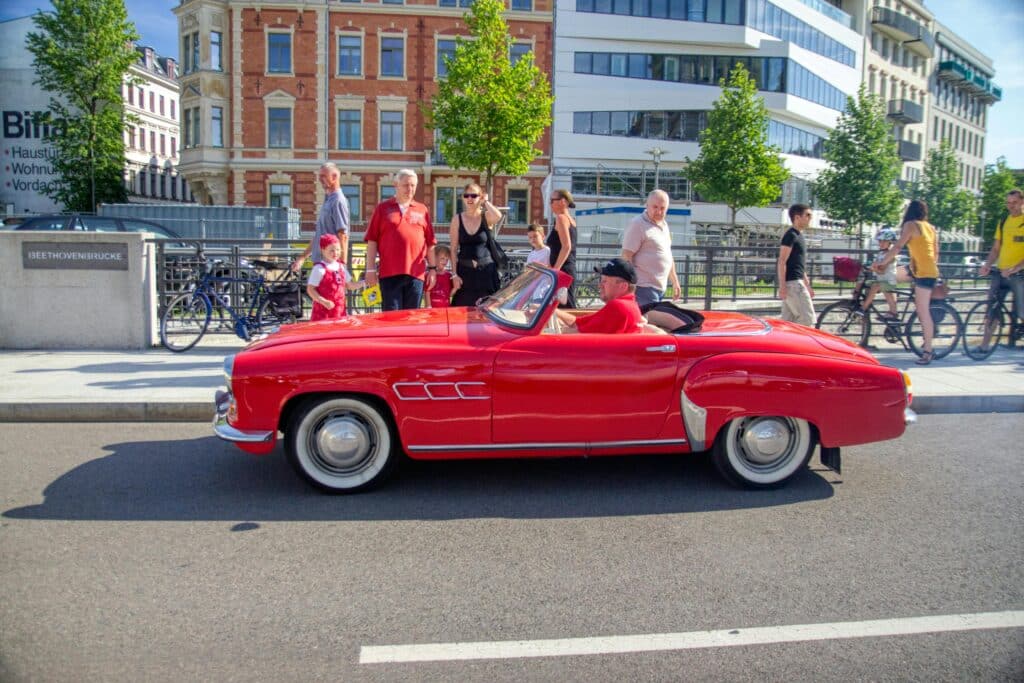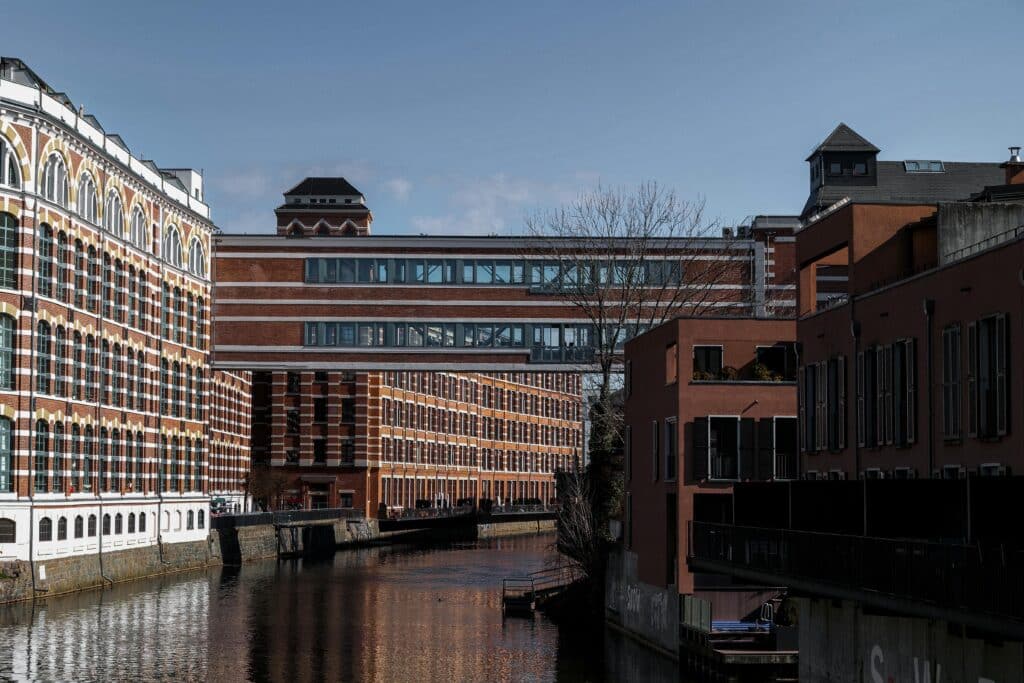
Here at Remitly, we understand the challenges of relocating to a new city, and we’re here to help you make the transition as smooth as possible. So if you’re considering moving to Leipzig, whether for work, study or any other reason, we’ve put together a handy guide for you.
Leipzig is one of Germany’s most historic and culturally important cities, famous as the home of the composer Johann Sebastian Bach. It’s been one of the country’s most important trading hubs since the Middle Ages, and also played a crucial role in the reunification of Germany in 1989.
While Leipzig may not be as well-known as larger German cities such as Berlin or Munich, it has plenty to offer international residents: in fact, it’s been named one of the best underrated cities in Germany for expats.
Table of Contents
Essential facts about Leipzig
| Population | 628,718 |
| Popular Neighborhoods | Lindenau, Plagwitz, Reudnitz, Gohlis, Südvorstadt, Schleußig |
| Average Rent for a 1-Bedroom Apartment | 390-1000 € / month |
| Top Industries | IT, manufacturing, logistics and e-commerce, life sciences, energy and environmental technology |
| Number of Expats | 59,000 |
A quick introduction to Leipzig
Leipzig is in eastern Germany, in the state of Saxony, about 150 km south-west of Berlin. It’s the eighth-largest German city, with a population of around 607,000. The largest proportion of immigrants (33.2%) are from other EU countries, followed by Syria (14.5%), Romania (6.3%) and Russia (5.5%). It has a relatively young population, with 65.9% aged between 15 and 65.
Leipzig is a haven for coffee-lovers. It boasts the oldest coffee house in Germany as well as other stunning historic cafés such as Café Riquet with its imposing Art Deco architecture. The city is ranked as the German city with the highest quality of life: its residents expressed a 95% satisfaction rate.
Where to live in Leipzig
Where should you head to when moving to Leipzig for the first time? Here’s a quick run down of some of the most popular residential districts in Leipzig:
Lindenau
Lindenau is located west of the city center. It’s a cultural hotspot, with an impressive eight theaters and the exhibition center Kunstkraftwerk, as well as the Spinnerei, a former cotton mill and now a complex of artists’ studios, galleries and exhibition spaces. Expect to pay around €600 to €800 per month for a one-bedroom apartment.
Plagwitz
Like Lindenau, neighboring Plagwitz has a thriving art scene. It’s also very climate-conscious: If you’re looking for an eco-friendly lifestyle, this is the area for you. Formerly popular with punks and squatters, it’s now becoming gentrified, but retains its alternative vibe.
Reudnitz
In the eastern part of the city, Reudnitz is particularly popular with students due to its proximity to several university campuses; however, it also attracts young professionals and families. It boasts several green spaces and parks. The average rent for a one-bedroom apartment could be around €350 to €600 per month.
Gohlis
Gohlis, a residential area in the north of the city, is multicultural and relatively affordable. Locals rate its beer gardens and the variety of restaurants offering a variety of cuisines.
Südvorstadt
If you’re looking for nightlife, this is the place to be: It has plenty of bars, clubs and music venues. Independent shops and boutiques are also a feature of this lively neighborhood, which is popular with students.
Schleußig
A great choice for families: Leipzig International School is located in this south-western suburb, which also has an attractive and child-friendly park, the Clara Zetkin Park. If you like the quiet life, Schleußig could be for you. Rent could cost around €700 to €1000 per month for a one-bedroom apartment.
Finding accommodation in Leipzig
The main sites for finding accommodation in Germany are ImmobilienScout24, Immonet and Immowelt, all of which advertise properties for rent and sale. Most people in Germany rent their homes; homeownership is much less common than in countries like the UK or the USA. In Leipzig, only 11% of residents are homeowners.
Most apartments in Germany are rented unfurnished, so you’ll need to factor in the cost of buying your own furniture. It can also come as a surprise to Brits and Americans that kitchen fittings are frequently not included, unless the advertisement specifically states that the property has a fitted kitchen (“Einbauküche”).
Shared accommodation (“Wohngemeinschaft” or “WG”) is also popular among students and young professionals in Leipzig, as in most German cities. The online portal WG-Gesucht is the main forum for finding shared houses and apartments. Students can also use the Studentenwerk Leipzig portal to find rooms in student halls of residence or shared apartments.

The legal aspects of living in Leipzig
If you’re going to live in Germany for more than three months, you must register your address with the authorities. This is known as “Anmeldung” and is required by law. Without registering, you can’t get a registration certificate (“Meldebestätigung”), which you’ll often need to prove your address or open a bank account, get a tax ID or use government services. You’ll also need to register your address if you’re applying for a residence permit.
To register, you need to go to your local residents’ services office (“Bürgerbüro”). Bear in mind that there are often long waiting times for appointments.
You’ll need a tenancy confirmation (“Wohnungsgeberbestätigung”) from your landlord, which you’ll typically receive after you sign the lease. You may not get this from a short-term accommodation provider, so if you intend to stay in Leipzig for more than three months, look around for a permanent (“unbefristet”) rental contract.
The City of Leipzig’s official website has a section in English on what you need to do when moving to Leipzig as a student, including how to register your address and how to apply for a residence permit.
Public transport in Leipzig
Leipzig has an excellent public transport system, with a wide-reaching network of trams as well as buses and local train services. The main railway station—the Hauptbahnhof— is an important hub in Germany’s rail network, with direct connections to Berlin, Dresden, Munich, Frankfurt and many other major German cities. Leipzig also has its own airport, with a wide choice of both internal and international destinations.
Driving in Leipzig
If you want to drive in Leipzig, you’ll need a driving license issued in Germany or another EU country. You’re only allowed to drive with a license from a non-EU country for six months, after which you’ll have to convert your license to a German one. You can do this at the driver’s license office (“Fahrerlaubnisbehörde”).
Services and amenities: the essentials
The official local government portal for Leipzig has plenty of useful information available in English for newcomers to Leipzig.
Healthcare
All German residents must have health insurance. There are two kinds of health insurance: public and private. The City of Leipzig website has a useful guide to healthcare facilities in Leipzig, including a list of English-speaking medical professionals.
Banking and money
If you’re an EU citizen, it’s fairly simple to open a German bank account. If you’re from a country outside the EU, you’ll need to provide the following documents to open a bank account:
- Proof of ID, such as a passport;
- A valid visa or residence permit;
- Proof of your address (“Anmeldung”);
- Evidence of your income or employment status;
- Proof of your student status (if you’re applying for a student account).
Some banks will also ask for a SCHUFA, an official statement of creditworthiness.
If you have trouble providing the above, some of the “challenger banks” such as N26 and Monese will allow you to open a German bank account with simply a proof of ID. The University of Leipzig has a helpful guide to opening a German bank account.
Luckily, Leipzig is one of the six cheapest cities to live in Germany, and considerably cheaper than either New York or London. For more information on the cost of living in Leipzig, check out our guide.
Utilities
Registering for utilities is one of the first things you’ll need to do when you move to Leipzig. The utilities market in Germany is deregulated, so you can choose your gas and electricity supplier.
If you want an environmentally friendly option, some providers, such as Leipziger Stadtwerke, offer “eco-tariffs” offering locally generated “green energy.”
To find out which providers are available in your local area and compare prices, you can use a price comparison tool such as Preisvergleich. This useful site also allows you to compare internet, cable TV and mobile phone tariffs, insurance policies, credit providers and banks, as well as shopping sites.
Water is provided at the local level, so your provider in Leipzig will be Leipziger Wasserwerke.
Food and eating out
You’ll find the major German supermarkets in Leipzig: Edeka and Rewe are two of the biggest supermarket chains, as well as the budget supermarkets Lidl and Aldi. For organic food, there is Denns BioMarkt or Alnatura, both of which have several branches in Leipzig.
Farm shops and farmers’ markets are great for fresh local produce. There are also plenty of smaller shops where you can find international foods, especially in the more multicultural neighborhoods like Gohlis.
Leipzig has a wide range of restaurants and cafés to suit all tastes and budgets. Head to Auerbachs Keller for traditional cuisine, or sample the local beer in one of Leipzig’s many beer gardens.

Culture, social life and entertainment
Leipzig has a rich cultural heritage, particularly in classical music. The world-renowned opera house and the Gewandhaus concert hall (home to the Gewandhaus Orchestra, one of the world’s oldest orchestras) attract visitors from across the globe. There’s an annual Bach Festival, held at the historic St Thomas Church where the composer was musical director for several years.
However, if your musical taste is more contemporary, you won’t be disappointed: Leipzig is home to one of Germany’s most successful bands, Die Prinzen, and also has a thriving techno scene. Leipzig also hosts the long-running annual goth festival, Wave Gotik Treffen.
Leipzig also boasts an impressive array of museums, including the Museum of Fine Arts, the Natural History Museum and the Museum in the Round Corner (Museum in der runden Ecke), dedicated to the history of the GDR secret police, the “Stasi.”
The city has two major sports stadiums, one of which is home to the local football club RB Leipzig. If you’re more interested in participating in sport than watching it, you’ll also find a wide variety of sports clubs and associations.
Making friends when you’re new in Leipzig can be challenging, but luckily there are plenty of social clubs and meetups, such as BlaBla Language Exchange, which is designed for those looking to forge local and international friendships.
Working in Leipzig
If you’re a German citizen or a citizen of another EU country, Iceland, Liechtenstein or Norway, you can legally work in Leipzig. If you’re from Australia, Canada, Israel, Japan, New Zealand, South Korea, the United Kingdom or the United States, you need a residence permit (“Aufenthaltstitel”) to work, study or freelance in Germany.
If you already have a job offer before moving to Germany, you’ll need to apply for a work visa.
The work visa isn’t applicable if you’re self-employed, though: If you’re a freelancer, take a look at our guide on how to get a digital nomad visa in Germany. If you don’t already have a job, you’ll need a jobseeker visa. This is aimed at people with a recognized university degree and is valid for six months. If you want to undertake voluntary work in Leipzig, we’ve put together a guide on getting a volunteer visa in Germany.
For academics and people with related qualifications who want to take up qualified employment in Germany, there’s a special visa known as the EU Blue Card. To obtain the Blue Card, you must already have a job offer in Germany with a gross annual salary of at least €45,300 (as of 2024).
If you have taxable income from any source in Germany, you’re legally required to pay taxes, whether you’re a resident or a non-resident. To help you understand your tax obligations, we’ve put together a guide to filing your taxes in Germany.
The good news is that you may be eligible for certain tax deductions. Find out what you’re entitled to and how to claim it in our article on tax deductions for immigrants in Germany.
Finding a job in Leipzig
Leipzig is an attractive location for companies in all sectors, in particular logistics and e-commerce: Household names Amazon and DHL have a presence here, as does the cargo department of Deutsche Bahn. The University of Leipzig is also one of the city’s major employers, as are research institutes The Helmholtz Centre for Environmental Research and the Fraunhofer Gesellschaft.
For job opportunities, online portals such as LinkedIn and Indeed.com are good places to start, as well as the German government portal Jobsuche, where you can customize your search by location, sector and employment type (full-time, part-time, remote etc.). The City of Leipzig has its own jobseeker portal where local government jobs are advertised.
While having some knowledge of German will give you a distinct advantage, it’s possible to find a job in Leipzig as an English speaker. Check out English Jobs Germany or Find a Job in Germany.
Studying in Leipzig
Leipzig is an important center of higher education in Germany, with several universities, both public and private, offering a wide range of courses.
- The best known is the prestigious University of Leipzig, where Goethe studied and which attracts many international students.
- The Leipzig University of Applied Sciences (HTWK) is one of Germany’s largest technical universities and is particularly strong in IT, media and communications.
- The Saxon Academy of Sciences and Humanities (“Sächsische Akademie der Wissenschaften zu Leipzig”), founded in 1846, attracts top scientific researchers from a wide variety of disciplines.
- The Academy of Fine Arts Leipzig (Hochschule für Grafik und Buchkunst) offers a number of courses in painting and graphics, book art and graphic design, photography, and media arts.
- There’s also a world-class university of music and theater, the Hochschule für Musik und Theater “Felix Mendelssohn Bartholdy.”
There’s plenty to get involved with as a student in Leipzig: Many halls of residence have student clubs, and Studentenwerk Leipzig has a list of events designed to help international students settle in, get to know the city and make friends. However, if you’re feeling lonely or struggling, they also offer services for international students, including advice and counseling.
FAQ
Leipzig’s crime rate is lower than that of Berlin, Hamburg or Cologne, and indeed many other cities in Europe. It’s generally a safe, diverse and multicultural city where attitudes are more tolerant.
As a central European city, Leipzig enjoys a moderate climate. Winter can be cold, with an average temperature of 1 °C, while summers are generally warm, averaging at 19 °C with daytime temperatures of 24 °C.
To a certain extent you can, but German will be helpful if you want to talk to locals. It’s worthwhile taking a language course or, if you prefer to learn independently, try out a language-learning app.
The Battle of the Nations was a landmark event in Leipzig’s history, in which a coalition of forces from Russia, Prussia, Austria, and Sweden defeated Napoleon’s army, resulting in disaster for France and the loss of the French empire’s presence east of the Rhine. This historic battle, which took place in 1813, is commemorated in an imposing monument, now one of Leipzig’s top tourist attractions.
In 1497, Emperor Maximilian I granted the town imperial trade fair rights. In 1507, he granted the ”Stapelrecht,” handling rights which forced passing traders to sell their goods in the town. That began Leipzig’s reputation as a trading hub: It’s still known for its trade fairs.
Not always. Make sure to check whether the rent includes heating costs (“Warmmiete” or “Warm rent”) or not (“Kaltmiete” or “Cold rent”). You may also see the term “Gesamtmiete” (“total rent”) which includes both heating and building utility costs (“Nebenkosten”).
It isn’t compulsory, but it protects you against being sued for accidentally damaging someone else’s property. Here’s a step-by-step guide to what liability insurance is and why you might need it.
The best known regional dish is Leipziger Allerlei, consisting of mixed vegetables, which may be served as a main or side dish. Leipzig is also famous for Gose beer, a top-fermented, slightly sour wheat beer. Those with a sweet tooth will want to try the Bachtaler: a rich chocolate casing filled with ganache, with a coffee bean enclosed in hazelnut shortcrust pastry in the middle.
